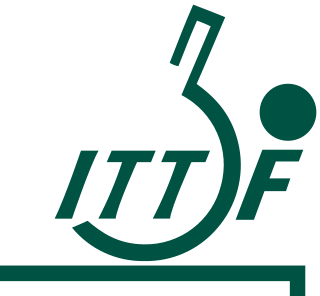
Table tennis is a racket sport derived from tennis but distinguished by its playing surface being atop a stationary table, rather than the court on which players stand. Either individually or in teams of two, players take alternating turns returning a light, hollow ball over the table's net onto the opposing half of the court using small rackets until they fail to do so, which results in a point for the opponent. Play is fast, requiring quick reaction and constant attention, and is characterized by an emphasis on spin relative to other ball sports, which can heavily affect the ball's trajectory.
Ping-pong diplomacy refers to the exchange of table tennis (ping-pong) players between the United States (US) and People's Republic of China (PRC) in the early 1970s, that began during the 1971 World Table Tennis Championships in Nagoya, Japan as a result of an encounter between players Glenn Cowan and Zhuang Zedong. The exchange and its promotion helped to humanize the people in each country after a period of isolation and distrust. It paved the way for President Richard Nixon's visit to Beijing in 1972, and is considered a turning point in relations between the United States and the People's Republic of China.

The International Table Tennis Federation (ITTF) is the governing body for all national table tennis associations. The role of the ITTF includes overseeing rules and regulations and seeking technological improvement for the sport of table tennis. The ITTF is responsible for the organization of numerous international competitions, including the World Table Tennis Championships that has continued since 1926.
Zhang Yining is a Chinese table tennis player who retired in 2009. She is considered one of the greatest female players in the sport's history. In terms of achievements, she is one of the most successful female table tennis players having won the gold medal in each of the Table Tennis World Cup, the Table Tennis World Championships, and the Olympic Games. She is also the first player overall, and the first female, to have completed a Double Grand Slam.

Wang Nan is a female Chinese table tennis player from Liaoning. Wang was ranked world #1 on the ITTF ranking system from January 1999 to November 2002. She is left-handed, and began playing table tennis when she was seven years old. Her particular skills are changing the placement of the ball during rallies and her loop drive, as well as her notable speed. Wang has been the leader of the women's table-tennis team of China after Deng Yaping's retirement. In terms of achievements, she is one of the most successful female table tennis players having won the gold medal in each of the Table Tennis World Cup, the Table Tennis World Championships, and the Olympic Games.

Table tennis competition has been in the Summer Olympic Games since 1988, with singles and doubles events for men and women. Athletes from China have dominated the sport, winning a total of 60 medals in 37 events, including 32 out of a possible 37 gold medals, and only failing to win at least one medal in one event, the inaugural Men's Singles event at the 1988 Summer Olympics.
Yang Ying is a Chinese table tennis player, born 13 July 1977 in Xuzhou, Jiangsu Province. She achieved gold medals at several World Table Tennis Championships in either doubles or team play. She played right-handed Chinese penhold style. Her main techniques were forehand and backhand speed drives. Since 2008 Yang has been working as a table tennis commentator for CCTV-5.

The World Table Tennis Championships are table tennis competitions sanctioned by the International Table Tennis Federation (ITTF). The World Championships have been held since 1926, biennially since 1957. Five individual events, which include men's singles, women's singles, men's doubles, women's double and mixed doubles, are currently held in odd numbered years. The World Team Table Tennis Championships, which include men's team and women's team events, were first their own competition in 2000. The Team Championships are held in even numbered years.

Paralympic table tennis has been competed at every Summer Paralympic Games since they were first held in 1960. Men and women compete in singles and team events in ten different classes according to the extent of their disability.

Ni Xia Lian is a Chinese-born table tennis player who represents Luxembourg since 1991. She was born in Shanghai, and resides in Ettelbruck.
The Asian Table Tennis Championships is a biennial table tennis tournament regarded as continental championships by International Table Tennis Federation (ITTF). From 1952 to 1972, the tournament was organized by the Table Tennis Federation of Asia (TTFA). The Asian Table Tennis Union (ATTU) started its own Asian Championships due to split between national table tennis associations in Asia.

Ichiro Ogimura was a Japanese table tennis player, coach, president of the ITTF and former World No. 1 who won 12 World Championship titles during his career. Ogimura was also a key figure in the Ping Pong Diplomacy events of the early 1970s, as well as being instrumental in Korea playing as a unified team at the 1991 World Table Tennis Championships.
Guo Yuehua is a former Chinese table tennis player.
Kimiyo Matsuzaki is a former international table tennis player from Japan.
The World Para Table Tennis Championships are the world championships for para table tennis where athletes with a disability compete. They are organised by the International Table Tennis Federation (ITTF) on a four-year rotation with the Paralympic Games.
European Para Table Tennis Championships are a biennial sport event for para table tennis players who represent a European country. It is one of the first regional para table tennis championships to be held. France have so far earned the most medals in these championships.
The 2019 World Table Tennis Championships were held in Budapest, Hungary from 21 to 28 April 2019. It was the 55th edition of the championships, and the fourth time that they were held in Budapest.
The 2024 World Team Table Tennis Championships are scheduled to be held in Busan, South Korea from 16 to 25 February 2024. Quarterfinalists of the 2024 World Championships will be qualified for the 2024 Summer Olympics.

Chennai Lions is an Indian professional table tennis franchise based in Chennai, that plays in Ultimate Table Tennis. It was established in 2019 by film director Aishwarya R. Dhanush and entrepreneur Sameer Bharat Ram. They are the reigning champions of the league after defeating Dabang Delhi TTC in 2019 UTT finals.
The 2021 World Table Tennis Championships was held in Houston, United States from 23 to 29 November. It was the 56th edition of the championships and the first time the competition was held in the United States. Houston became the host by beating Agadir, Morocco in 2019.









